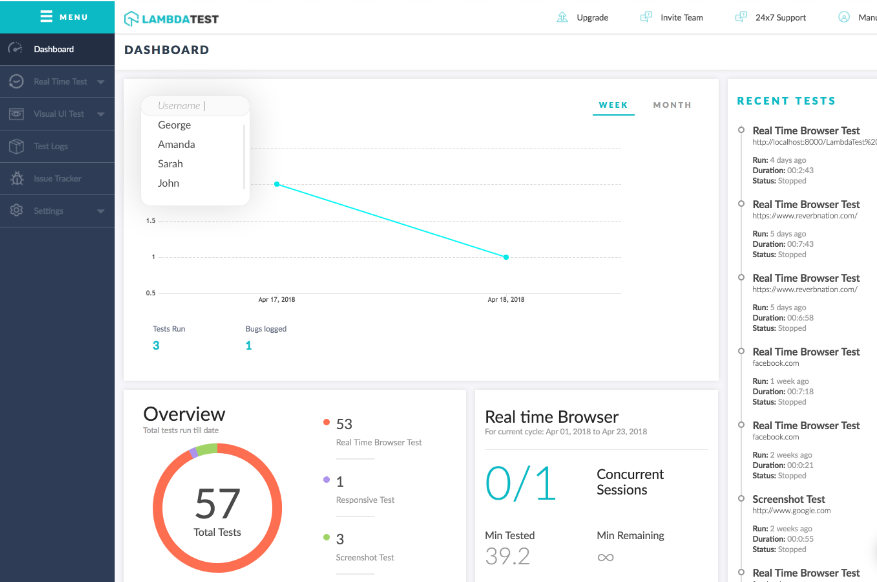Are you struggling to find the most reliable automation QA testing tools? By 2023, there’s a projected upsurge in demand for cutting-edge software testers.
This blog can help ease your search by revealing the top ten best automation QA testing software tools of that year.
Key Takeaways
- The top 10 automation QA testing software tools for 2023 include Testsigma, Selenium, Telerik Test Studio, Katalon Studio, LambdaTest, Cucumber, Appium, TestingWhiz, ClickUp and Jam.
- These tools help improve software quality by identifying and fixing bugs early on.
- Automation QA testing tools save time and cost by automating repetitive tasks and allowing testers to focus on critical aspects of their work.
- They provide consistent performance across different platforms and devices.
Why Automation Testing is Essential

Automation testing is essential for identifying and preventing bugs, enhancing user experience, optimizing performance, maintaining software security, and achieving cost and time efficiency.
Identifying and preventing bugs
Bugs can harm a software’s work. Finding and stopping bugs is key to smooth running. QA testing tools are good at this job. For example, Selenium helps find errors in web apps early on.
The same goes for Telerik Test Studio and Katalon Studio. These tools go through each part of the software. They look for problems that users might face later on. Then they tell us about these problems so we can fix them fast.
This way, the software works better and makes users happy.
Enhancing user experience
Automation QA testing tools make apps and sites better for people to use. They look for bugs that can slow things down or stop them from working right. This helps users trust the software and stay happy with it.
These tools can also test new features before they go live. So, when a user tries out something new on an app or site, they have a smooth experience.
The use of these tools helps teams spot issues early. It leads to fixes that turn into improved user experiences fast. For example, Katalon Studio is a great tool for this task. It makes sure your web application works well all the time.
Optimizing performance
Automated QA testing tools help make software faster. They can find parts of the code that slow down a program. This aids teams in fixing these issues quickly. Doing so boosts how well the app works and gives users a smoother experience.
Two top automation tools mentioned, Selenium and LambdaTest, provide such abilities. These tools are part of the 10 best automation QA Testing software tools for 2023 because they optimize performance greatly.
Maintaining software security
Software security is a crucial aspect of any application. It helps protect sensitive data and prevents unauthorized access. When it comes to maintaining software security, automation testing tools play a significant role.
These tools help identify vulnerabilities in the code and ensure that the application is safe from potential threats. By conducting regular security tests, these tools can detect any weaknesses or loopholes in the system, allowing developers to fix them before hackers exploit them.
One such tool mentioned in the article is Tricentis Tosca, which offers advanced security testing capabilities, including vulnerability scanning and penetration testing. Another tool called ACCELQ also provides features for secure API testing and compliance validation.
These automation testing tools contribute to enhancing software security by identifying risks and ensuring that robust measures are in place to safeguard against cyber attacks.
By using these top automation QA testing software tools, companies can proactively address potential security issues before they become major problems. This helps maintain the integrity of their applications while providing users with a safe and protected experience.
Ensuring software security should be a priority for all organizations as it not only protects sensitive data but also builds trust among users and stakeholders alike.
Cost and time efficiency
Automation testing tools are essential in achieving cost and time efficiency in software testing. By automating repetitive tasks, these tools can save valuable time that would otherwise be spent on manual testing.
This not only speeds up the overall testing process but also allows QA teams to focus their efforts on more critical aspects of the software. Additionally, automation tools help reduce costs by minimizing the need for a large workforce to perform manual tests.
With automated scripts running multiple tests simultaneously, companies can achieve higher productivity with fewer resources. Ultimately, using automation QA testing tools leads to cost savings and faster release cycles for software development projects.
Advantages of Using QA Testing Tools
Using QA testing tools offers numerous benefits, including enhanced software quality, improved user satisfaction, cost efficiency, time savings, early issue detection, and consistent performance.
Enhanced software quality
Using QA testing tools can greatly enhance the quality of software. These tools help identify and fix bugs, ensuring that the software runs smoothly and without any issues. By using automation testing tools, developers can detect problems early on, saving time and effort in the long run.
Additionally, these tools provide consistent performance and can be utilized for various types of testing like API, web, and mobile testing. Overall, by employing QA testing tools, software quality is improved significantly.
Improved user satisfaction
Using QA testing tools can greatly improve user satisfaction. These tools help identify and fix bugs in software, ensuring a smoother and more seamless experience for users. By optimizing performance, these tools also ensure that the software functions efficiently and meets user expectations.
Additionally, they help maintain software security, protecting user data and providing peace of mind. With their cost efficiency and time-saving capabilities, QA testing tools enable businesses to deliver high-quality products that satisfy their users’ needs and preferences.
With early issue detection and consistent performance monitoring, these tools ensure that any potential issues are addressed promptly, leading to improved user satisfaction in the long run.
Cost efficiency
Automation testing tools offer significant cost savings for businesses. They can help in reducing the need for manual testing, which is time-consuming and expensive. By automating repetitive tasks, these tools allow QA teams to focus on more critical areas of testing that require human expertise. Additionally, the upfront investment in automation tools may seem high initially but provides long-term benefits by minimizing the overall cost of testing. With automation, businesses can detect and fix bugs early on, saving them from costly rework or customer dissatisfaction later. The top automation QA testing software tools mentioned in the article, such as Selenium and Katalon Studio, are known for their cost efficiency and value-for-money features. Invest in the right automation tool to save costs and improve software quality at the same time.
Time savings
One of the advantages of using QA testing tools is the significant time savings they offer. These automation tools can execute tests and generate results much faster than manual testing methods.
For example, TestComplete and Cypress are mentioned as top automation testing tools that help save time during software testing processes. With these tools, testers can write test scripts once and run them multiple times without needing to repeat the same steps manually each time.
This automation not only speeds up the testing process but also allows testers to focus on more critical aspects of their work, such as analyzing results and identifying any potential issues or bugs.
By reducing the time spent on repetitive tasks, QA testing tools enable teams to deliver high-quality software products more efficiently and meet tight project deadlines.
Additionally, TestingWhiz was identified as one of the top automation QA testing software tools for 2023 in terms of time efficiency. It offers features like codeless scripting that helps reduce script creation time significantly.
Early issue detection
Early issue detection is a crucial advantage of using QA testing tools. These tools help identify bugs and glitches in software early on, before they become major problems. By catching issues at an early stage, developers can make necessary adjustments and fixes, ensuring that the final product functions smoothly and meets user expectations.
This proactive approach to issue detection saves time and resources by preventing costly rework later in the development process. It also improves the overall quality of the software by addressing potential issues before they impact users’ experience.
With automation testing tools, developers can catch problems early and deliver higher-quality software to their users.
Consistent performance
Consistent performance is a key advantage of using QA testing tools. These tools ensure that software applications perform reliably and consistently across different platforms and devices.
With automated testing, you can identify any performance issues early on in the development process, allowing you to make necessary optimizations and improvements. This not only enhances the overall user experience but also helps maintain the reputation of your software by delivering high-quality products consistently.
By utilizing top automation testing tools like Testsigma, Selenium, Telerik Test Studio, Katalon Studio, LambdaTest, Cucumber, Appium, TestingWhiz, ClickUp, and Jam in 2023, you can achieve consistent performance for your applications while saving time and effort.

Top QA Testing Tools for Software Testing in 2023
In 2023, some of the top QA testing tools for software testing include Testsigma, Selenium, Telerik Test Studio, Katalon Studio, LambdaTest, Cucumber, Appium, TestingWhiz, ClickUp, and Jam.
Testsigma
Testsigma is one of the top automation QA testing software tools for 2023. It helps in validating web applications and offers features that enhance software testing capabilities. Testsigma, being a cloud-based tool, allows users to create test cases easily without writing any code.
It also provides support for API and web testing. With Testsigma, teams can improve their software testing efficiency and effectiveness by automating repetitive tasks and detecting issues early on.
This tool is designed to meet the needs of quality assurance engineers and testers who want to streamline their testing processes and achieve better results in less time.
Additionally, with Testsigma’s lean test automation approach, teams can scale up their testing efforts while maintaining speed without compromising on quality engineering standards.
The platform comes with a user-friendly interface that enables easy collaboration among team members throughout the entire software development lifecycle. By using Testsigma as a part of your QA arsenal, you can ensure that your web applications are thoroughly tested for functionality, performance, security, and overall user experience.
Remember: Investing in reliable automation QA testing tools like Testsigma can bring numerous benefits such as cost efficiency, time savings, enhanced software quality, improved user satisfaction, early issue detection as well as consistent performance across different devices and platforms.

Selenium
Selenium is one of the top automation QA testing tools for software testing in 2023. It is an open-source framework that allows you to automate web applications. With Selenium, you can write test scripts in various programming languages like Java, C#, and Python.
This tool is popular because it supports multiple browsers and platforms, making it versatile for different testing needs. Selenium helps improve software quality by detecting issues early on and ensuring consistent performance across different environments.
It is a valuable tool for both manual testers transitioning to automation and experienced automation testers looking for advanced features.
Telerik Test Studio
Telerik Test Studio is one of the top automation QA testing software tools for 2023. It offers a range of features that can help enhance software testing capabilities. With Telerik Test Studio, you can easily create and execute automated tests for web applications, ensuring their quality and reliability.
This tool provides an intuitive interface, making it user-friendly even for those with limited coding knowledge. Additionally, Telerik Test Studio supports cross-browser compatibility testing, allowing you to ensure your application works seamlessly across different browsers.
Its powerful debugging and recording capabilities make test creation efficient and effective. Overall, Telerik Test Studio is a valuable tool for any QA engineer looking to streamline their testing processes and deliver high-quality software products.

Katalon Studio
Katalon Studio is one of the top automation QA testing software tools for 2023. It offers a wide range of features and benefits that can enhance your software testing capabilities.
With Katalon Studio, you can easily write test cases and automate web application testing. It is an open-source tool that provides a user-friendly interface for creating and executing tests.
Katalon Studio also supports API testing, making it versatile for different types of testing purposes. By using Katalon Studio, you can save time and achieve consistent performance in your software testing efforts.
LambdaTest
LambdaTest is one of the top automation QA testing software tools for 2023. It offers a range of features that can help enhance your software testing efforts. With LambdaTest, you can perform web application testing across different browsers and operating systems, ensuring compatibility and functionality.
This tool allows you to write test cases in a simple and efficient manner, making it easier to identify bugs and issues. Additionally, LambdaTest provides real-time interactive debugging capabilities, allowing you to troubleshoot problems quickly.
One standout feature of LambdaTest is its scalability and speed. Whether you need to run a small set of tests or thousands of them, this tool can handle it with ease. The fast execution time helps save both time and effort during the testing process.
Moreover, LambdaTest supports parallel testing, enabling multiple tests to be executed simultaneously across different browsers.
By utilizing LambdaTest as your automation QA testing tool, you can improve the quality of your software while saving on costs and time. Its user-friendly interface makes it accessible for testers with different levels of expertise.

Cucumber
Cucumber is one of the top automation testing tools mentioned in the article. It is an open-source tool widely used for behavior-driven development (BDD) and acceptance testing. Cucumber allows testers to write test cases in a natural language format that can be easily understood by both technical and non-technical team members.
With Cucumber, you can create readable and executable specifications called “feature files” that outline desired behaviors of your software application. These feature files are written in Gherkin language, which uses keywords like Given, When, and Then to define test steps and expected outcomes.
This tool promotes collaboration between developers, quality assurance (QA) engineers, and business stakeholders as it focuses on clear communication and shared understanding of requirements.
Cucumber also offers integrations with popular programming languages such as Java, Ruby, Python, .NET, allowing you to automate tests using your preferred language. By leveraging Cucumber’s capabilities, teams can improve their efficiency in testing web applications while ensuring clear documentation and alignment across different project stakeholders.
[Audience]: Technology audience
Appium
Appium is a popular automation testing tool that is widely used for mobile app testing. It allows developers and testers to write automated tests for mobile applications across different platforms like iOS, Android, and Windows.
Appium supports multiple programming languages such as Java, Python, Ruby, and JavaScript. This tool offers various features like cross-platform compatibility, real device testing, and easy integration with other tools.
With Appium, testers can automate UI interactions, test different app functionalities, and ensure the smooth performance of their mobile applications on various devices.
TestingWhiz
TestingWhiz is among the top automation QA testing tools for 2023. It offers a range of features and benefits to enhance software testing capabilities. With TestingWhiz, you can perform web, API, and mobile testing efficiently.
It helps identify bugs early on, ensuring high-quality software development. TestingWhiz also saves time and money by automating repetitive tasks in the testing process. Its user-friendly interface makes it easy for testers of all roles to use effectively.
Overall, TestingWhiz is a reliable tool that can greatly improve your software testing efforts in 2023.
ClickUp
ClickUp is one of the top automation testing tools mentioned in this article. It offers a wide range of features and benefits for software testing. With ClickUp, you can easily manage and organize your test cases, track bugs, and collaborate with your team members.
It also provides integrations with other popular tools like Jira and Slack, making it easier to incorporate into your existing workflow. ClickUp’s user-friendly interface makes it accessible for both experienced testers and beginners.
Overall, ClickUp is a valuable tool that can help enhance your automation testing process and improve the quality of your software applications.
Jam
Jam is one of the top automation QA testing software tools for 2023. It offers features that can enhance software testing efficiency and effectiveness. With Jam, you can validate web applications, conduct API testing, and even test mobile applications.
It is a popular choice among quality assurance professionals due to its user-friendly interface and comprehensive testing capabilities. By using Jam, you can ensure the quality and performance of your software while saving time and resources.
How to Evaluate Test Automation Tools
When evaluating test automation tools, it is crucial to consider key factors such as team needs and specific roles within the organization. By assessing these elements, businesses can make informed decisions and select the most suitable QA automation tool for their software testing requirements.\

Key considerations for choosing a QA automation tool
To choose the right QA automation tool for your needs, there are a few key considerations to keep in mind. First, assess your team’s specific needs and requirements. Consider factors like the type of testing you will be performing (web, API, mobile), the level of technical expertise within your team, and any specific features or functionalities that are important to you.
Next, consider how user-friendly the tool is. Look for a tool that has a simple and intuitive interface, as this will make it easier for your team to use and navigate.
Another important consideration is scalability. Make sure the tool can handle your current workload as well as potential future growth without compromising performance.
Integration capabilities are also crucial. Choose a tool that can seamlessly integrate with other tools in your tech stack, such as bug tracking systems or test management tools.
Lastly, consider the cost-effectiveness of the tool. Take into account not only the upfront cost but also any licensing fees or additional expenses that may arise down the line.
Assessing team needs
To choose the right automation testing tool, it’s important to assess your team’s needs. Consider factors like the size of your team, their skill levels, and the type of projects they work on.
For example, if you have a large team with varying levels of experience, you may need a tool that offers both beginner-friendly features and advanced capabilities. If your team primarily works on web applications, look for tools that specialize in web automation testing.
Understanding your team’s specific requirements will help you select an automation testing tool that best meets their needs and maximizes efficiency.
Actionable advice for test automation tool selection based on roles
- Consider the specific roles and responsibilities of your team members when choosing a test automation tool.
- For developers, look for tools that integrate seamlessly with popular programming languages such as Java, Python, or C#.
- Testers may benefit from tools that offer easy-to-use interfaces and support various testing types like functional, regression, or performance testing.
- Test managers should prioritize tools that provide comprehensive reporting and analytics capabilities to track testing progress and identify areas for improvement.
- DevOps teams can benefit from tools that facilitate continuous integration and delivery (CI/CD) pipelines, allowing for seamless automation across the software development lifecycle.
- Consider the scalability requirements of your organization. Some tools may be better suited for small teams or startups, while others are designed to handle enterprise-level needs.
- Evaluate the support and training options provided by the tool’s vendor. Look for resources such as documentation, tutorials, forums, or dedicated customer support channels.
- Take into account the budget allocated for test automation. Some tools offer free or open – source versions with limited features, while others require a subscription or licensing fees.
- Prioritize tools that align with your technology stack and ecosystem. Compatibility with your existing infrastructure and software development tools can streamline integration and improve workflow efficiency.
- Consider the long – term viability of the tool. Look for active community participation, regular updates and enhancements, and a proven track record in the industry.
Remember to consider these factors based on your team’s specific needs and goals to make an informed decision when selecting a test automation tool.
Conclusion
In conclusion, the year 2023 presents a range of powerful automation QA testing software tools that can greatly enhance software quality and efficiency. From popular options like Selenium and Appium to emerging contenders like Testsigma and Katalon Studio, these top tools offer features that cater to different testing needs such as API, web, and mobile testing.
By incorporating these tools into their QA processes, businesses can optimize their performance, save time and cost, detect issues early on, and deliver a seamless user experience.
Stay ahead in the world of software testing by exploring these top automation QA testing tools in 2023!
Frequently Asked Questions
What are automation QA testing software tools?
Automation QA testing software tools are programs or applications used to automate the testing process of software applications, ensuring that they meet quality standards and function properly.
Why should I use automation QA testing software tools?
Using automation QA testing software tools can save time and effort by automating repetitive tasks, increasing test coverage, improving accuracy, and providing faster feedback on the quality of the software.
How do I choose the best automation QA testing software tool for my needs?
When choosing an automation QA testing software tool, consider factors such as your specific requirements, budget constraints, ease of use, compatibility with other systems, available features like reporting and integration capabilities.
Are these automation QA testing software tools free to use?
Some automation QA testing software tools offer free versions or trial periods with limited features while others require a paid subscription for full functionality. It’s important to research and compare different options before making a decision.
Can I use multiple automation QA testing software tools together?
Yes, it is possible to integrate multiple automation QA testing software tools together depending on their compatibility and supported integrations. This can provide a more comprehensive solution for your specific needs in terms of test coverage and efficiency.
Author
-
Anisha Jain, a dynamic professional in the sports SaaS industry, transitioned from economics to digital marketing, driven by her passion for content writing. Her tenure at TBC Consulting culminated in her role as CEO, where she honed her skills in digital strategy, branding, copywriting, and team management. Anisha's expertise encompasses various aspects of digital marketing, including 360-degree marketing, digital growth consulting, client communication, and business development, making her a versatile asset in the SaaS domain.
View all posts




